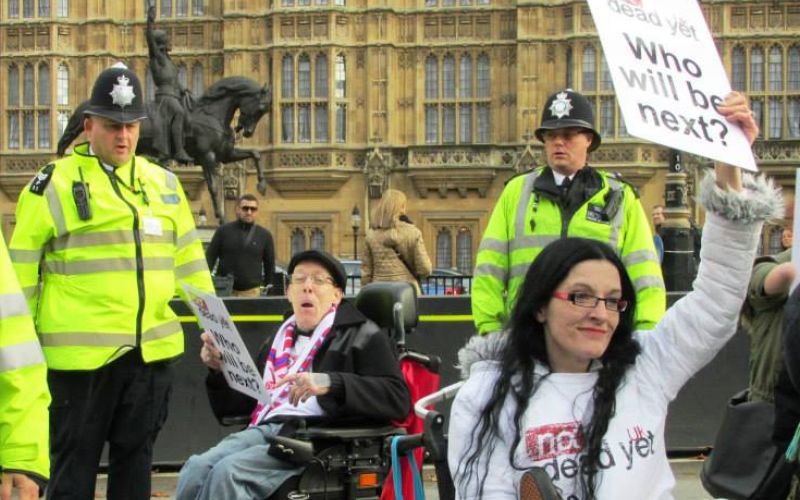Dennis Queen (pictured, right), a leading member of the campaign group Not Dead Yet UK, says the support of disabled academic Dr Tom Shakespeare for the assisted dying bill ignores its dangerous flaws
What Tom has said is very disappointing to me.
Tom seems more concerned about the few in a position to make fair choices who don’t get an easy suicide laid on a plate, than the majority of folks who haven’t got the same privileges and will access the new provisions in law and kill themselves, possibly due to suffering which may have real solutions. There is nothing in the bill to examine the causes of a person’s suffering and suicidal feelings and seek other ways to reduce suffering.
It is predicted that 3,500 folks will kill themselves in the first year using this provision in law, if it comes in, more than trebling the assisted suicide figures in the law’s target group (compared to the 1,000 (on average) who already end their lives early using palliative care options, and six (again, on average) whose assisted suicides are investigated by the director of public prosecutions each year).
Tom appears to agree that there are going to be some problems with the safeguards – although he believes the number of such cases will be virtually negligible. However, there are serious and unavoidable problems with the safeguards proposed, which will affect everyone assessed under the Bill.
The safeguards Tom refers to take up very few words of the bill and consist of a minimal two conversations with different GPs – who need not know us – and a judge in an office, signing off their paperwork as legal.
Just this week, the British Medical Journal finally picked up on doctors’ concerns about whether someone can be both suicidal and mentally competent. This is currently a concept which does not exist in medicine, and is not described in the bill, which includes no obligation to have a psychiatric evaluation before being granted an assisted suicide.
I can’t help wondering if the absence of such a safeguard is because the proponents of the bill know that no psychiatrist will say that a suicidal person is mentally healthy. Ordinarily, being suicidal, in medical terms, means a person is not mentally competent. This then provides them with active protection and prevention from suicide.
If the bill is brought in, our GPs will have no criteria against which to decide on what is currently a non-existent medical state, so people’s lives will be decided on instead by guesswork. Being calm and sure of ourselves (the bill’s “clear and settled intent”) during two GP consultations does not mean a person is not depressed or is not having other mental health problems.
I am glad that Tom agrees that the assisted dying bill would be easily bypassed. This is why we think it is better that assisted suicides are kept to those which happen within healthcare already, under supervision, and those others which actually get investigated, as they are now, by the director of public prosecutions, who is very sympathetic already towards assisted suicide. This law will rule the assisted suicides lawful in advance and they will not be checked afterwards to ensure that they actually were legal.
This assisted suicide bill circumvents the messy, expensive issue of meaningfully helping people who are suicidal, suffering and not imminently dying. There is no majority call for it from the people it affects, because they are already helped to die comfortably when they are actually dying. It circumvents society’s responsibility to support people in the last months of their life, as we would anyone else. It doesn’t actually award us anything resembling human rights; instead, it takes away our right to have our death, or killing (depending on how it’s done), investigated like anybody else’s. It is deadly discrimination. We all already have a more than equal right to kill ourselves.
Nobody in England and Wales should be left suffering to the point that this is an attractive option. We need to stop accepting that and ask the public to please support our call for help instead, during this time of savage cuts to almost all assistance to live better lives.
Death cannot improve our quality of life – it is not the solution to suffering. We will keep fighting this bill because the people it is actually about don’t want it, by an overwhelming majority. The public think they will, but you can’t bring in a law based on what people imagine to be true! Especially if it’s going to cause real people to die, who, let’s face it, have plenty of good reasons to feel miserable.
Let’s not play into that, let’s help make sure everyone who lives here can be helped to live the best life they can – for all of it. We should not strip away such basic human rights, based on a rough estimation of a person’s life span.
Picture by Paula Peters

 Disabled peers plan to ‘amend, amend, amend, amend, amend’ after assisted dying bill reaches Lords
Disabled peers plan to ‘amend, amend, amend, amend, amend’ after assisted dying bill reaches Lords This bill opens the door to scandal, abuse and injustice, disabled activists say after assisted dying bill vote
This bill opens the door to scandal, abuse and injustice, disabled activists say after assisted dying bill vote Absence of disabled people’s voices from assisted dying bill has been ‘astonishing’, says disabled MP
Absence of disabled people’s voices from assisted dying bill has been ‘astonishing’, says disabled MP